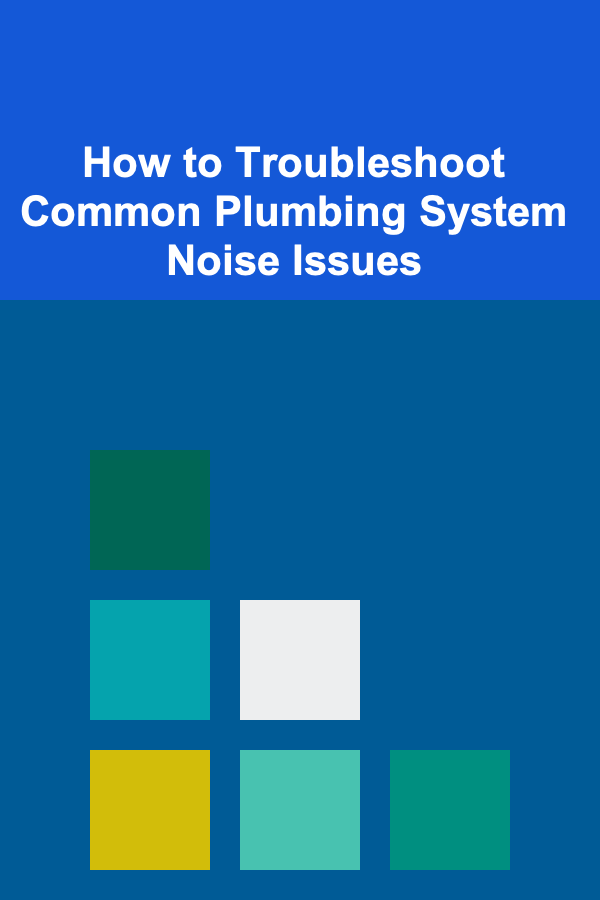
How to Troubleshoot Common Plumbing System Noise Issues
ebook include PDF & Audio bundle (Micro Guide)
$12.99$8.99
Limited Time Offer! Order within the next:

Plumbing systems are an integral part of any home or commercial building, ensuring that water is delivered efficiently for daily tasks such as washing, cooking, and cleaning. However, when you start hearing unusual noises coming from the pipes, fixtures, or appliances, it can be frustrating and even alarming. Understanding and troubleshooting these common plumbing noises can save you time, money, and prevent potential damage to your system.
In this comprehensive guide, we will explore some of the most common plumbing system noise issues, how to troubleshoot them, and the steps you can take to resolve them.
Understanding Plumbing System Noise
Before diving into troubleshooting, it's important to understand the types of noises that plumbing systems can produce. Some of the most common plumbing system noises include:
- Banging or Hammering Sounds (Water Hammer)
- Whistling or Squealing Noises
- Gurgling Sounds
- Dripping or Trickling Sounds
- Rattling or Vibrating Noises
Each type of noise may have a different underlying cause and requires a specific approach to resolve it. Let's take a deeper look at each of these issues and how you can troubleshoot them.
Water Hammer (Banging or Hammering Noises)
Water hammer is one of the most common and annoying plumbing noises, characterized by loud banging or hammering sounds that occur when water flow is suddenly stopped. The noise is caused by a sudden change in the velocity of water as it is abruptly halted by a valve or faucet closing quickly.
Cause:
Water hammer occurs when fast-moving water is suddenly stopped by a valve or faucet, causing the water to slam against the closed valve, resulting in shockwaves that travel through the pipes. This can cause vibrations and produce a loud banging noise.
Troubleshooting and Solutions:
- Install Water Hammer Arrestors: These devices are designed to absorb the shockwaves created by water's sudden stoppage. They are usually installed near the source of the problem, such as at the end of a pipe or near a faucet.
- Check Pipe Supports: Loose or improperly secured pipes can exacerbate the noise. Check your pipes to ensure they are securely anchored to prevent vibrations.
- Slow Water Flow: If the problem is caused by a sudden rush of water, you may want to consider installing flow restrictors or regulators to slow down the water flow, which can help prevent water hammer from occurring.
Prevention:
Water hammer can be prevented by ensuring that your plumbing system is properly installed, with sufficient pipe supports and pressure-reducing valves if necessary. Regular maintenance of the system will help to minimize this issue.
Whistling or Squealing Noises
Whistling or squealing sounds in your plumbing system are typically caused by high water pressure or a restriction in the flow of water through the pipes or faucets.
Cause:
- High Water Pressure: When the water pressure in your plumbing system is too high, it can cause water to force its way through the pipes, leading to a high-pitched whistling or squealing sound.
- Blocked or Partially Closed Valves: If a valve is partially closed or obstructed, it can restrict the flow of water, causing the pipes to vibrate and emit a squealing noise.
- Clogged Faucet Aerators: Aerators are the small mesh screens on faucets that help to control the flow of water. When these aerators become clogged with mineral deposits or debris, they can restrict water flow, resulting in a whistling noise.
Troubleshooting and Solutions:
- Check Water Pressure: Use a water pressure gauge to measure the pressure in your plumbing system. The ideal water pressure is usually between 40 and 60 psi. If the pressure is too high, you can install a pressure-reducing valve to bring it down to a safe level.
- Inspect Valves: Check the main shut-off valve, faucets, and any other valves in your system to ensure they are fully open. If they are partially closed, open them all the way to allow for proper water flow.
- Clean Faucet Aerators: If the whistling noise is coming from a faucet, remove the aerator and clean it. Soak it in vinegar to remove mineral deposits, and ensure there is no debris blocking the holes.
Prevention:
To prevent this issue in the future, ensure your plumbing system is regularly maintained. Install a pressure regulator to keep the water pressure at optimal levels, and clean your faucet aerators periodically to avoid clogs.
Gurgling Sounds
Gurgling noises from your plumbing system are often heard when drains or toilets are used. These sounds can indicate that there is a blockage or an issue with the ventilation of your system.
Cause:
- Clogged Drains: A blockage in the drain pipes, such as hair, grease, or food debris, can cause water to struggle to flow through the pipes, resulting in gurgling sounds.
- Ventilation Issues: Plumbing systems rely on vent pipes to allow air to enter the system, which helps water to flow freely. If the vent pipes are blocked or clogged, it can cause air to be trapped in the pipes, leading to gurgling sounds.
- Sewer Line Problems: In some cases, gurgling can be a sign of problems with your sewer line, such as a partial blockage or damage.
Troubleshooting and Solutions:
- Clear Blockages: Use a plunger, drain snake, or a mixture of baking soda and vinegar to clear out any blockages in the drains. For more stubborn clogs, you may need to use a professional drain cleaning service.
- Check Ventilation: Inspect the vent pipes on your roof to ensure they are not blocked by debris, leaves, or other obstructions. Clear any blockages to ensure proper airflow in your plumbing system.
- Sewer Line Inspection: If the gurgling noise is coming from toilets or drains connected to the sewer line, it may be an indication of a problem with the sewer line. In this case, it's best to contact a plumber for a professional inspection and possible repair.
Prevention:
To prevent gurgling sounds, keep your drains clear of debris and regularly inspect your vent pipes. Regular maintenance and a professional inspection of your sewer lines can help prevent major issues.
Dripping or Trickling Noises
If you hear constant dripping or trickling sounds coming from your plumbing system, it can be a sign of a leak, especially if the sound is heard when no water is being used.
Cause:
Dripping or trickling noises are usually caused by water leaking from a pipe, faucet, or appliance. The sound occurs as water escapes from a small crack or gap and slowly drips into the surrounding area.
Troubleshooting and Solutions:
- Inspect Faucets and Showerheads: Check your faucets and showerheads for leaks. Even a small leak can cause a noticeable dripping noise. If you find any leaks, replace the washers or seals to stop the water from escaping.
- Examine Pipes for Leaks: If the noise is coming from behind walls or under floors, you may have a hidden pipe leak. In this case, you should check for any signs of water damage or mold. If you suspect a major leak, contact a plumber immediately.
- Check Appliances: Leaking appliances, such as water heaters, dishwashers, or washing machines, can also cause trickling sounds. Inspect these appliances for any signs of leaks or drips.
Prevention:
To prevent leaking sounds, regularly inspect faucets, pipes, and appliances for signs of wear or damage. Replacing old washers and seals in faucets and showerheads can help avoid leaks.
Rattling or Vibrating Noises
Rattling or vibrating noises in your plumbing system can be unsettling, and they are often caused by pipes that are not properly secured or have become loose over time.
Cause:
- Loose Pipes: When pipes are not securely fastened to the walls or floor, they can vibrate or rattle when water is flowing through them.
- Water Pressure Fluctuations: Sudden changes in water pressure can cause pipes to shake or rattle, especially if the water pressure is too high.
Troubleshooting and Solutions:
- Secure Loose Pipes: Inspect your pipes for any signs of movement or looseness. If you find loose pipes, use pipe clamps or brackets to secure them to the wall or floor. This will prevent them from rattling when water is flowing.
- Install a Pressure Regulator: If the rattling is caused by high water pressure, installing a pressure regulator will help stabilize the water pressure and prevent further vibrations.
Prevention:
Ensure that your pipes are properly secured during installation, and consider installing a pressure regulator to avoid pressure fluctuations that can lead to vibrations.
Conclusion
Plumbing system noises are often a sign of an underlying issue that needs to be addressed. By understanding the common causes of these noises and taking the right steps to troubleshoot and resolve them, you can maintain a quiet, efficient, and effective plumbing system. Regular inspections, proper maintenance, and timely repairs can help prevent many of these issues from escalating and causing costly damage to your plumbing system.
When in doubt, don't hesitate to consult a professional plumber to ensure that your plumbing system is functioning properly and free from any disruptive noises. By staying proactive, you can enjoy a well-maintained plumbing system that runs smoothly and quietly.
Reading More From Our Other Websites
- [Mindful Eating Tip 101] Family Food Flow: Building Mindful Eating Routines with Your Little Ones
- [Personal Care Tips 101] How to Use Hand Cream for a Relaxing and Rejuvenating Experience
- [Home Party Planning 101] How to Plan a Home Party with a Focus on Healthy Snacks and Drinks
- [Personal Investment 101] Turning Deep Learning into a Profitable Side Hustle
- [Home Family Activity 101] How to Create a Meaningful Family Crest: A Step‑by‑Step Guide
- [Organization Tip 101] How to Reflect on Past Seasons to Improve Future Organization
- [Home Maintenance 101] How to Clean and Maintain Your Home's Chimney
- [Personal Care Tips 101] How to Apply Lip Gloss for a Natural, Shiny Finish
- [Personal Care Tips 101] How to Use Shaving Cream for a Quick, On-the-Go Shave
- [Rock Climbing Tip 101] Best Fingerboard Routines for Power‑Endurance Boost in Indoor Climbing

7 Ways to Monetize Your Deep Learning Skills
Read More
How to Create a Soundproof Home Theater for the Ultimate Experience
Read More
How to Create an Outdoor Wellness Sanctuary
Read More
How to Plan a Cozy, Low-Key Home Gathering with Friends
Read More
How to Use LED Strips to Add a Pop of Color to Your Home Lighting
Read More
How to Live a Fully Sustainable Life
Read MoreOther Products

7 Ways to Monetize Your Deep Learning Skills
Read More
How to Create a Soundproof Home Theater for the Ultimate Experience
Read More
How to Create an Outdoor Wellness Sanctuary
Read More
How to Plan a Cozy, Low-Key Home Gathering with Friends
Read More
How to Use LED Strips to Add a Pop of Color to Your Home Lighting
Read More